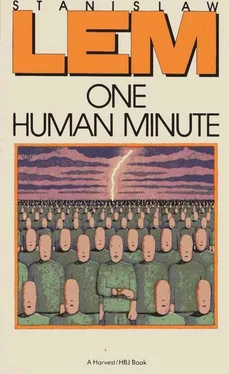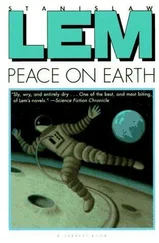The editors, I’m sure, allowed such a skeptical and agnostic introduction, knowing that they had a best seller, because with best sellers condemnation as well as praise increases sales. A cynical observation, perhaps, but true.
Naturally, pirate editions and imitations of One Human Minute have appeared. It will be amusing and fitting if the next edition includes phenomena of this sort under the headings “Intellectual Theft” and “Counterfeiting of Information"; the once-innocent appearance of a best seller now produces a train of imitators — a pack of jackals and hyenas following a lion. Meanwhile, computer crime has moved from fantasy into reality. A bank can indeed be robbed by remote control, with electronic impulses that break or fool security codes, much as a safecracker uses a skeleton key, crowbar, or carborundum saw. Presumably, banks suffer serious losses in this way, but here One Human Minute is silent, because — again, presumably — the world of High Finance does not want to make such losses public, fearing to expose this new Achilles’ heel: the electronic sabotage of automated bookkeeping. Therefore there is no heading in the book for computer crime, but it is bound to show up sooner or later, in a future edition.
Since the copyright covers the title of the book but not the idea that gave birth to it, one can now find, in the bookstores, The World Now, What’s Happening, Fantastic Reality/Real Fantasy — which have slightly modified figures in the decimal places, so that the publisher of One Human Minute would have difficulty in court in the event of a plagiarism suit. All these imitations, of course, are cut from the same cloth; only once, as I was turning the pages of one of them, did I come upon an introduction that was rather original. The mass media, it said, are never completely objective. In fact, the pattern is like this: the worse the news in the local press, the more freedom there is and the better conditions are in the society that prints it. If journalists are wringing their hands, tearing their hair, predicting the end, and bewailing imminent ruin, then the streets are rivers of glistening cars, the store windows are packed with delicacies, everyone walks around tanned and rosy-cheeked, and a handcuffed wretch brought to prison at gunpoint is harder to find than a diamond in the gutter. And vice versa: where prisons are overcrowded, where gloom and fear prevail, where poverty is terrible, one usually reads — in the papers — news that is cheerful, uplifting, determinedly joyous (telling you that you had better participate in the general happiness), and syrupy press releases paint life in rainbow colors (except that it is a rainbow that will shine — but not just yet). This introduction claims an important role for One Human Minute and its imitators: to supply the complete truth.
The original One Human Minute is supposed to be computerized, so that one can call it up on one’s home computer. But most people will prefer the volume on the shelf. And so the book, styling itself “all books in one,” will increase the mass of printed paper. In it you can find out how many trees fall per minute to saw and ax all over the world. Forests are turned into paper to make newspapers that call for the forests to be saved. But that piece of information is not in One Human Minute. You have to figure it out yourself.
Now One Human Minute has indeed been computerized, but not in the way I imagined. The fact is, the contents of the book were becoming, slowly but surely, anachronistic. The number of people in the world keeps increasing; new catastrophes and calamities are added to the old ones; new means of production create different articles for daily consumption. Therefore, as in the case of yearly almanacs, it came time to revise the book — or rather, to recalculate it from scratch. But a character appeared, even cleverer than the Johnsons; he decided to put a perpetual One Human Minute on the market — valid from year to year — like a perpetual calendar! In an era of pocket calculators, electronic chessplayers, and a host of similar devices claiming to embody “artificial intelligence” (which has not been attained yet but someday, no doubt, will be), when you can buy even a pocket translator to carry on simple conversations in a foreign language, it was possible to make an electronic version of this book, avoiding the need for continual corrections and new editions.
The year is entered, the subject code selected from the menu. Also, one can move both forward and backward in time. Naturally, seeing that the machine can show how many children were born thirty years ago, and how many three hundred years ago, a person is tempted to give it a tougher problem: how many people watched television when Columbus discovered America? The machine is not that stupid, however, and is not taken in. The answer that appears in the little window is “0.” We are soon convinced that the past has all been entered in the memory of this new, microcomputerized version of One Human Minute. But it is more interesting to use it to look at the future. You cannot jump more than one hundred years forward: when you try, you get an “E” in the little window, signaling overload, as in any ordinary calculator. Future data are extrapolations, derived from such weighty mathematics that I wouldn’t dream of going into it. The only thing certain is that all the data are uncertain, like any statement about the future. But since The Perpetual Human Minute is really not a book, the book reviewer has no further obligation to it; there remains for him only this parting, possibly profound remark:
In the Holy Scriptures it is said that in the beginning was the Word, and the Word was with God. Paraphrasing for our earthly use, we can observe that in the beginning was a computer, which brought forth this book, which became a computer again. An accident, perhaps, a superficial analogy — but I am afraid that it is not.
THE UPSIDE-DOWN EVOLUTION
Having gained access (by what means, I’m not at liberty to reveal) to several volumes on the military history of the twenty-first century, I pondered, first and foremost, how to hide the information they contained. The question of concealment was most important, because I understood that the man who knew this history was like the finder of a treasure who, defenseless, could easily lose it along with his life. I alone possessed these facts, I realized, thanks to the books that Dr. R.G. loaned to me briefly and which I returned just before his premature death. As far as I know, he burned them, thus taking the secret with him to the grave.
Silence seemed the simplest solution: if I kept quiet, I would save my skin. But what a shame, to sit on a thousand and one extraordinary things having to do with the political history of the next century, things opening up completely new horizons in all areas of human life. Take, for example, the astonishing reversal — completely unforeseen — in the field of artificial intelligence (AI), which became a force to be reckoned with precisely because it did not become the machine embodiment of the human mind. If I remained silent for my own safety, I would be depriving myself of all the advantages stemming from that knowledge.
Another idea occurred to me: to write down exactly what I remembered of those volumes and place the manuscript in a bank vault. It would be necessary to write down everything I retained from my reading, because with the passage of time I would forget many particulars of such a broad subject. Then, if I wanted to refresh my memory, I could visit the vault, take notes there, and return the manuscript to the strongbox. But it was dangerous. Someone could spy on me. Besides, in today’s world no bank vault was 100-percent secure. Even a thief of low intelligence would figure out, sooner or later, what an extraordinary document had fallen into his hands. And even if he discarded and destroyed my manuscript, I would not know it and would live in constant dread that the connection between my person and the history of the twenty-first century would come to light.
Читать дальше












